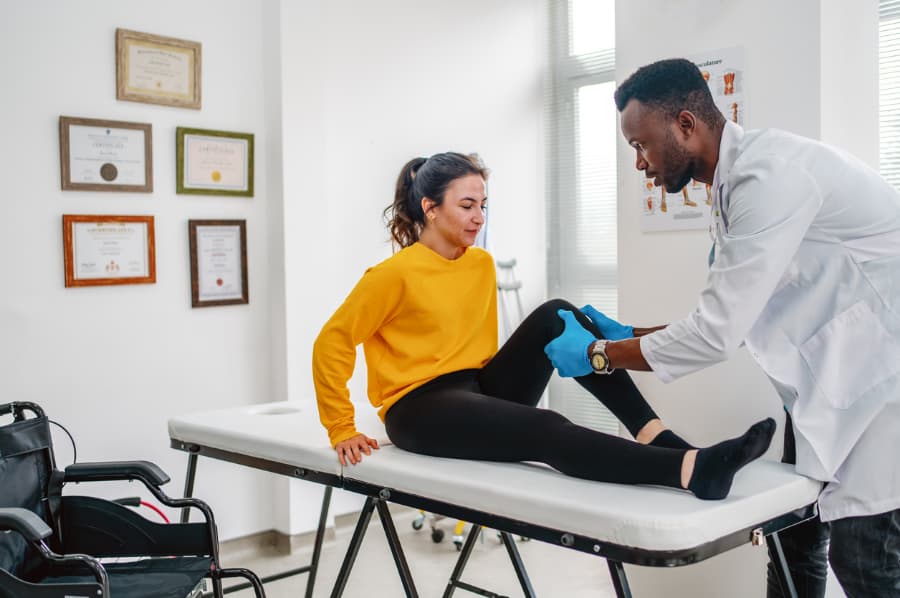A torn ACL can cause pain, swelling, and instability in the knee joint. A patient with an ACL injury may struggle with walking, jogging, or playing the sports they enjoy. While some patients with minor ACL injuries can find relief through physical therapy, physicians are increasingly recommending reconstruction surgery to treat major ACL tears. Learn more about the long-term effects of ACL tear without surgery in this post from Richmond University Medical Center in Staten Island, NY.
What Is a Torn ACL?
ACL stands for anterior cruciate ligament. It is a band of tissue in the knee that helps connect the shin bone and the thigh bone. Patients who play higher-impact sports such as football, basketball, or downhill skiing are at risk of an ACL tear or sprain. Typically, ACL injuries happen when an athlete lands from a jump, quickly changes direction, or is tackled. This type of sudden impact puts intense strain on the ligaments in their knees.
Symptoms of an ACL injury can include:
- A popping sensation in the knee
- Pain, swelling, and tenderness around the knee joint
- Loss of range of motion in the knee
- Discomfort when walking or putting weight on the knee
Along with a physical examination, ACL injuries can be diagnosed with imaging tests, such as an X-ray or MRI, that help rule out the possibility of fractures or other types of knee injuries.
Treatment Options for Torn ACL
Immediately after an ACL injury occurs, a patient should take steps to reduce swelling and inflammation. Keep the acronym “RICE” in mind, which stands for:
- Rest
- Ice
- Compression
- Elevation
The treatment options for an ACL tear include physical therapy and surgery.
Physical Therapy
Physical therapy can help reduce pain and swelling, strengthen the muscles around the knee, and restore the patient’s range of motion. The patient also may need to wear a brace that stabilizes their knee. More severe ACL tears require crutches so the patient can avoid putting weight on their knee entirely.
After completing a series of appointments with a physical therapist, the patient likely will need to continue performing the stretches and exercises they have learned at home. Physical therapy can be an effective method for patients who are less active or enjoy low-impact exercise.
Surgery
ACL reconstruction is a minimally invasive surgical treatment that requires only a couple of small incisions. Typically, an orthopedic surgeon will graft a tendon from another part of the patient’s body, such as the hamstring, to repair the ACL. A physician will administer anesthesia to keep the patient comfortable during surgery, and many patients can return home the same day. The patient usually will complete a course of physical therapy after their surgery.
If a patient tears their ACL but opts not to get surgery immediately, they may risk further injuries. A recent study from Hospital for Special Surgery in New York City found that delaying surgery in younger patients was associated with an increased risk of tearing the meniscus, a pad of cartilage in the knee that absorbs shock. For each week surgery was delayed, the study found a 2% increased risk of a medial meniscal tear.
People who experience an ACL injury have a higher risk of developing osteoarthritis in the knee. Surgery can help stabilize the knee, restore function in the joint, and help prevent long-term problems related to the injury.
Of course, each patient is different. What works for one patient may not be the best treatment method for another. A patient who has an ACL injury should talk with their physician about their treatment options and their goals for recovery.
Learn More About ACL Surgery
If you are considering treatment for an ACL injury, the team at Richmond University Medical Center is here to help. Our orthopedics department features experienced, board-certified surgeons with extensive experience in ACL surgery. We perform a wide range of joint surgeries and procedures, including:
- Reverse total shoulder replacement
- Meniscus repair
- Cartilage restoration “microfracture” surgery
- Total hip replacement – anterior approach
- Fracture treatments
- Carpal tunnel syndrome surgery
Richmond University Medical Center is a nonprofit hospital with multiple locations throughout Staten Island, NY, and serves patients in the surrounding area. For more information or to schedule an appointment, contact us today.




